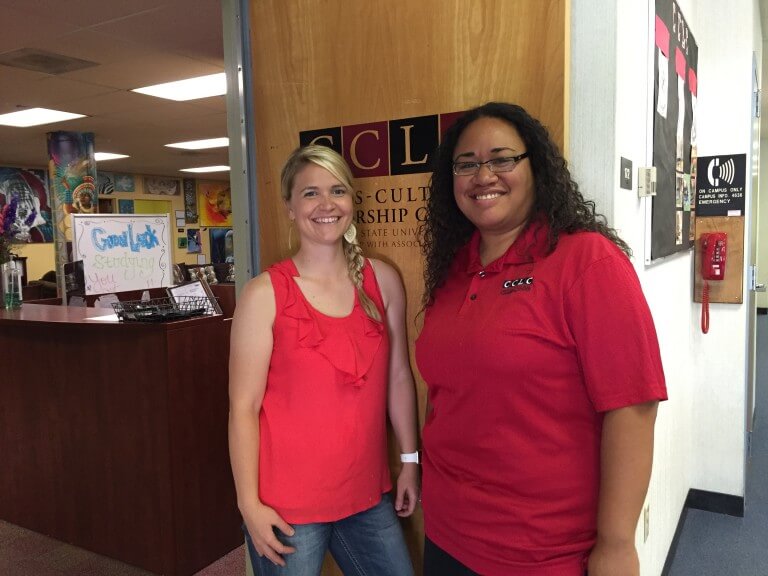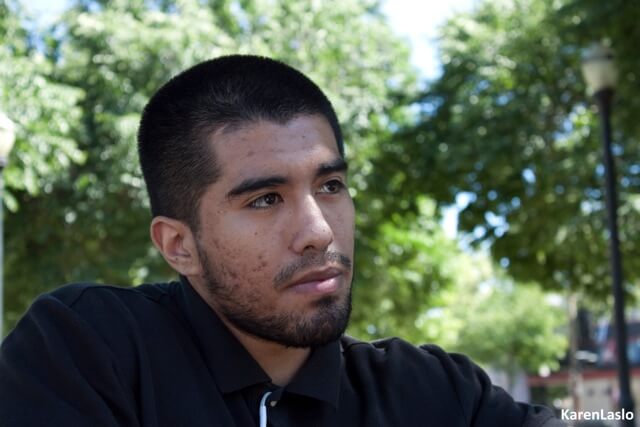On a recent Wednesday, Chico State journalism professor Mark Plenke was messaged that he should check the campus newspaper racks. The student-run weekly newspaper, The Orion, had come out earlier that day, and an opinion column was already producing a stream of angry social-media responses.
Plenke, the faculty adviser to The Orion, found some 600 newspapers missing from racks in Tehama and Butte halls and rescued them from nearby garbage and recycling bins. The May 10 column by student journalist Roberto Fonseca, “Debunking GSEC Myths,” had already inspired a newspaper theft and was on the verge of sparking a campus debate that would veer from angry threats to culture-wars name-calling to thoughtful discussion.
The column had been a sweeping attempt to take on what Plenke calls “hot-button issues” popular with conservatives — in only about 500 words. Fonseca argued that “systemic racism” doesn’t exist, that there are only two genders, and that the student-run Gender & Sexual Equity Center (GSEC) was promulgating false notions about “rape culture.” In fact, Fonseca wrote, rape culture doesn’t exist, either.
Soon, Fonseca, a 20-year-old junior who is finding his voice as a conservative columnist, was under fire for his writing skills, his choice of sources, his analysis. Before the week was out, a sign had been hung on the newspaper’s office door re-branding the paper “Rape Apologist News,” and he had received two threatening social-media messages.
At times, the discussion at Chico State has echoed the campus debates nationwide when speech is perceived as offensive, tapping into a well of anger. But it’s also a story about a university community’s frustration with its student paper, and with how journalism is often conducted in an era of polarized politics.
Some Orion critics say the column fits into what is now a pattern of irresponsible journalism, and they want more from the paper – more accuracy, more sensitivity, more listening.
Fonseca, who the staff named opinion editor for the coming academic year, said his column wasn’t meant to be “malicious.”
“Any sane person looking at this column knows it wasn’t meant to incite violence against anybody,” Fonseca said. “I was just trying to critique some ideas.”
But GSEC warned that articles can incite violence by reinforcing prejudice.
Rachel Ward, the student director of GSEC, said there’s a feeling on campus that “he didn’t write that article to open up an honest discourse. “It was written to purposely hurt and piss off a lot of people, especially in the political climate we live in,” she said.
Lindsay Briggs, a human sexuality professor, went further, labeling the column “hate speech” that was itself an act of violence because it “dismisses peoples’ identities.” Briggs, in defending students who have been marginalized, can seem brash, and she was, as she puts it, “boisterous” in challenging the column as hate speech.
“Fuck you, Roberto Fonseca,” she wrote in the first of several public Facebook posts about the column. Later, in Facebook conversations, she refers to him as “some garbage student” and “repugnant” and “shitty.”
On other parts of campus, the narrative has been different. Some journalism faculty say the article prompted a productive if painful discussion about free speech and gender and race. But in the view of some university staff, the column suggests the degree to which The Orion, in a time of sweeping change, has lost its footing.
Alternative facts vs. legitimate sources
The campus paper is a cornerstone of Chico State’s journalism program, having won a dozen national Pacemaker awards for general excellence. The staff works out of a basement office in Plumas Hall, and every week, after a new edition is published, receives a written critique by Plenke. But the adviser refrains from pre-publication intervention in keeping with state law that gives public high school and college students the right to freedom from censorship.
As the “opinion section conservative” on the paper during spring semester, Plenke believes Fonseca was “blindsided” by the response to the GSEC column. Earlier columns, Plenke said, made people “upset” but not “inflamed.”
In a March 25 column, Fonseca links terrorism to the Islamic faith, and says, “This is a religion that isn’t afraid to kill people for speaking out against their beliefs.”
By the end of May, the online version of Fonseca’s GSEC column had about 19,000 page views, making it the most viewed article for the year, according to The Orion’s May 16 editorial. The column had easily superseded – in terms of readership and certainly attention — news stories like a spring semester investigation into the costs of deferred maintenance at the university.
In the aftermath, readers struggled to respond to the column and, in some cases, with their frustration with the paper. There were reports that alumni threatened to withhold donations. There were calls for the adviser to undertake more active advising. And there was Briggs, who said she’d refuse interviews and otherwise refrain from collaborating with the paper, “so long as Roberto remains on staff and the Orion continues to peddle trash such as this.”
Briggs reported on Facebook that the parents of a prospective student saw her posts, contacted President Gayle Hutchinson, and declared that their child wouldn’t attend Chico State. Hutchinson then released her own statement and called Briggs to a meeting to remind her that her social media posts reflect on the university.
Some of the 242 comments posted on the story were sarcastic, others thoughtful. A few students indicated the column reflected their own thinking. But the majority were critical, slamming the column for what they said was poor writing or the use of biased sources.
“In our world of alternative facts, Roberto has a bright future. But which will he choose? Breitbart? Lifesitenews.com? Which proto-fascist rag will pick him up for his convenient opinions?”
The online version of Fonseca’s column links to research from mainstream media sources that provide facts, like the higher unemployment rates among Latinos and blacks compared to whites. He also cites sources that fall within the conservative mainstream, a right-leaning think tank and the journal “LifeSiteNews” that’s packed with propaganda and founded by a lobbyist group that opposes abortion and same-sex marriage.
The right-wing sources seem to help him justify the leap to his conclusions, such as, systemic racism “is another myth put out by GSEC members that is widely accepted,” and, “Latinos and African Americans are falling behind by choosing to believe in racism instead of hard work.”
Katie Peterson, program coordinator at the university’s Cross-Cultural Leadership Center, said the column had no foundation in sound research, and, yet, The Orion staff has access to professional journalists for guidance. 
“We’re allowing for a culture of alternative facts,” Peterson said. “The amount of hurt that was caused is ridiculous.”
Plenke defended Fonseca’s right to use conservative media sources – even though he says he had talked to the writer earlier in the semester about sourcing.
“It’s not uncommon for conservative commentators like Roberto to call on the sources he’s familiar with from the conservative side of the spectrum,” Plenke said. “I think there’s a legitimate argument about framing and the use of facts. I don’t happen to agree with most of what Roberto said, but that doesn’t give me the right to deny him the ability to frame an argument the way he wants to.”
Plenke decided not to report the newspaper theft because tempers were “hot” and a police report would further “inflame things.”
“Eventually, this drifted into more of a discussion about whether speech like that should be allowed, whether the column should have been published, whether editors fell down on the job,” he said.
The Orion’s outgoing Editor-in-Chief Carly Plemons couldn’t be reached despite several requests by ChicoSol for a brief statement.
Fonseca is the son of Nicaraguan immigrants and hails from Los Angeles. On May 17, after a week of intense scrutiny, he was interviewed at Chico’s City Plaza. A few days earlier, a journalism instructor had referred to his column as “fake news” and then led a heated class discussion about its content. Fonseca had been interviewed on the local nightly news.
Because of the class discussion, Fonseca said he now understood more clearly the phrase “rape culture.” He said he was wrong when he wrote that gender and sex are synonymous, wrong to tackle so much in a small space. But he said his conclusions were unchanged, just not supported well. “I acknowledge that my arguments probably weren’t the best,” he said.
He had read professor Briggs’ Facebook posts and seemed bewildered by them. “She says she hates me,” he said. “It sounds so personal.”
The Briggs offensive
On the Wednesday that Fonseca’s column was published, Lindsay Briggs, who describes herself on Facebook as “louder, meaner, sassier, and less afraid than most,” was on fire.
In a May 17 interview in her Butte Hall office, Briggs, who sits on the GSEC advisory board but doesn’t speak for the student-run organization, explained why Fonseca’s column was a personal affront. “This student has written several inflammatory articles all year that were terribly written and super-offensive, but they weren’t attacking anybody,” she said. “In this one, he utilized GSEC throughout.”
“As a queer person who is up close and personal with violence,” she told ChicoSol, “I see it day in and day out. I see the real effects of verbal violence all the time. I see the real effects of sexual assault and rape culture. Especially on this campus, where we do know that sexual assaults happen.”
After she read Fonseca’s column, she contacted journalism faculty, who explained that they don’t run the paper. She contacted the editors, who defended the column. That night, she said on Facebook that she had “pleasant but underwhelming” conversations with the journalism department. She announced her Orion boycott and encouraged other faculty to follow suit.
GSEC, Briggs pointed out, is a program run by five students that has far less institutional support than does The Orion. “I don’t think it’s fair to say, ‘Let’s let The Orion staff and the GSEC staff fight it out.’ That’s a denial of the systems of power in place.”
Briggs doesn’t believe in unlimited free speech in general, which she said makes her part of a small faculty contingent. But she said she doesn’t object to Fonseca’s First Amendment right to speak about his beliefs – as long as The Orion is not the platform.
“One of the things that’s really harmful right now,” Briggs said, “is that all ideas are valid and equal. That’s intellectually dishonest. Everybody’s right to an opinion has now become ‘all opinions are equal.’”
Losing patience with a campus learning lab
In the last edition of spring semester, The Orion published an editorial, “Campuses must choose between safe space or free speech” arguing that the column’s publication was a question of free speech. It cast the Chico State debate as one of many campus debates around the country pitting free speech against the right to critique or mock what college communities are calling “safe spaces.”
“To promote ‘safe spaces,’ speech is being suppressed,” the editorial states.
The editorial did not respond to critics who said Fonseca’s thesis hadn’t been well argued or to those who said that it was harmful to students who already feel vulnerable to verbal and physical attack. It didn’t address the fact that Fonseca says he didn’t fully understand some underlying concepts.
The paper also published three pages of letters to the editor about the column and a one-page op-ed by GSEC. (The op-ed wasn’t included in the paper’s online edition until someone contacted The Orion.)
Plenke, who agreed that he’s a “First Amendment absolutist,” applauded the editors, who he said “made the resources of the paper available to people who didn’t like the column.”
“While it hurts everybody’s stomach to have this level of anger,” Plenke said, “it did prompt some serious discussions on campus.”
But some students and staff resented the reliance on the First Amendment argument.
The president, Hutchinson, had already come down squarely on the side of free speech, although in her statement she attempted to distance the university from Fonseca’s column. “…the views expressed in the article in question do not reflect the values of our University,” she wrote.
Although GSEC does calls itself a “safe space,” offering a place of support for marginalized students, Ward was incensed by The Orion’s editorial, arguing that it presented a false dichotomy.
“I’m particularly offended by an editorial that suggests that safe spaces and free speech can’t co-exist,” she said, adding that it wasn’t his opinion that GSEC objects to but rather his use of sources. “We’re not negating his right to free speech — we would never go there.”
In her May 17 op-ed, Ward focused on a call to the journalism department and The Orion to hold its writers to “higher standards.” Ward said the paper needs to take measures to “restoring the trust that many students, faculty, and staff have lost in ‘The Orion’ in recent years due to a pattern of irresponsible and inaccurate reporting.”
Some in the campus community say that increased tension since the November election has made Fonseca’s columns particularly difficult to stomach. “Things have felt heightened,” Ward said. “The election has given a lot of people permission to be prejudiced in an explicit way. Students of color or who are queer or transgender have experienced firsthand slurs and have had rocks thrown at them.” (See sidebar.)
In several quarters, staff members are out of patience. After the publication of Fonseca’s column, the Student Health Center told The Orion that it no longer wants to be a distribution point for the paper, said Jill Cannaday, nursing supervisor. Cannaday said she was told that the health center can’t opt out by law, so when a bundle of the May 17 edition arrived, they remained “behind the counter” and “available upon request.”
Cannady said the center is used by students from many “walks of life,” some of whom are sexual assault survivors, and they deserve a “safe space” and welcoming environment.
At the Cross-Cultural Leadership Center, Program Director CC Carter said he no longer reads the paper. “From a diversity standpoint, every semester they do something that hurts and pisses off my students,” Carter said.
Two interviewees pointed to an April 2016 video The Orion posted – and that has never removed from its website — of Cesar Chavez Day interviews with drinking students as culturally offensive and shoddy journalism.
Journalism faculty say the paper’s independence is key to its “learning laboratory” features. Still, Susan Wiesinger, chair of the Department of Journalism & Public Relations, said it “pained” her to defend the GSEC column.
“The column was not particularly well written or carefully sourced and that is a poor reflection on the program,” she wrote in an email statement to ChicoSol. “…it’s peer-led, experiential learning. There will be mistakes and missteps. Our responsibility as a faculty is to take those teachable moments into the classroom and help the students figure out what could be done better or differently as they learn their professional skills.”
In the view of Plenke, the GSEC column produced a healthy debate and growth on the part of Fonseca, who has inched away from certainty in some of the beliefs he expressed in the column.
But for many members of the campus community, the debate and the classroom opportunities it presented came at a time when tension is high and patience either gone or thin. For GSEC’s Ward, they came at the expense of some of the university’s most vulnerable minority groups.
Leslie Layton wrote this story with support from New America Media’s Tracking Hate fellowship program. She retired from part-time teaching in the Chico State journalism department nine years ago. Layton is the editor of ChicoSol. This article has been republished with permission.



